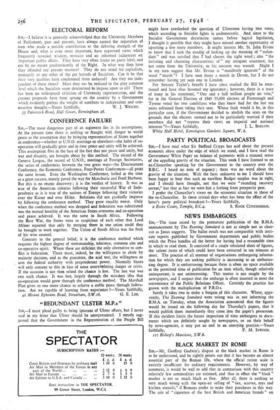NEWS EMBARGOES . SIR,—The issue raised by the premature public a tion of
the B.M.A. announcement by The Evening Standard is not as•simple nor as clear-
cut as Janus suggests. The ballot result was not comparable with intri-
cate reports, published by Government departments and public bodies which the Press handles all the better for having had a reasonable time
in which to read them. It consisted of a single tabulated sheet of figures, the salient items of which could have been extracted in ten minutes at most. The practice of all manner of organisations embargoing informa- tion for which they are seeking publicity is increasing to an embarras- sing degree. It is embarrassing because there is often no space available at the permitted time of publication for an item which, though relatively
unimportant, is not uninteresting.- This matter is not sought by the newspapers, and I suspect that the embargo is often inserted to meet the convenience of the Public _Relations Officer, Certainly the practice has grown with the multiplication of P.R.O.s.
Surely it takes two to make a bargain,,pf this character. Where, appa- rently, The Evening Standard went wrong was in not informing the B.M.A. on Tuesday, when the Association announced that the figures would be issued on the following day for Thursday's papers, that it
would publish them immediately they came into the paper's possession. If this incident limits the future imposition of time embargoes to docu- ments which are definitely sought by newspapers, or on their behalf by news-agencies, it may put an end to an annoying practice.—Yours


































 Previous page
Previous page